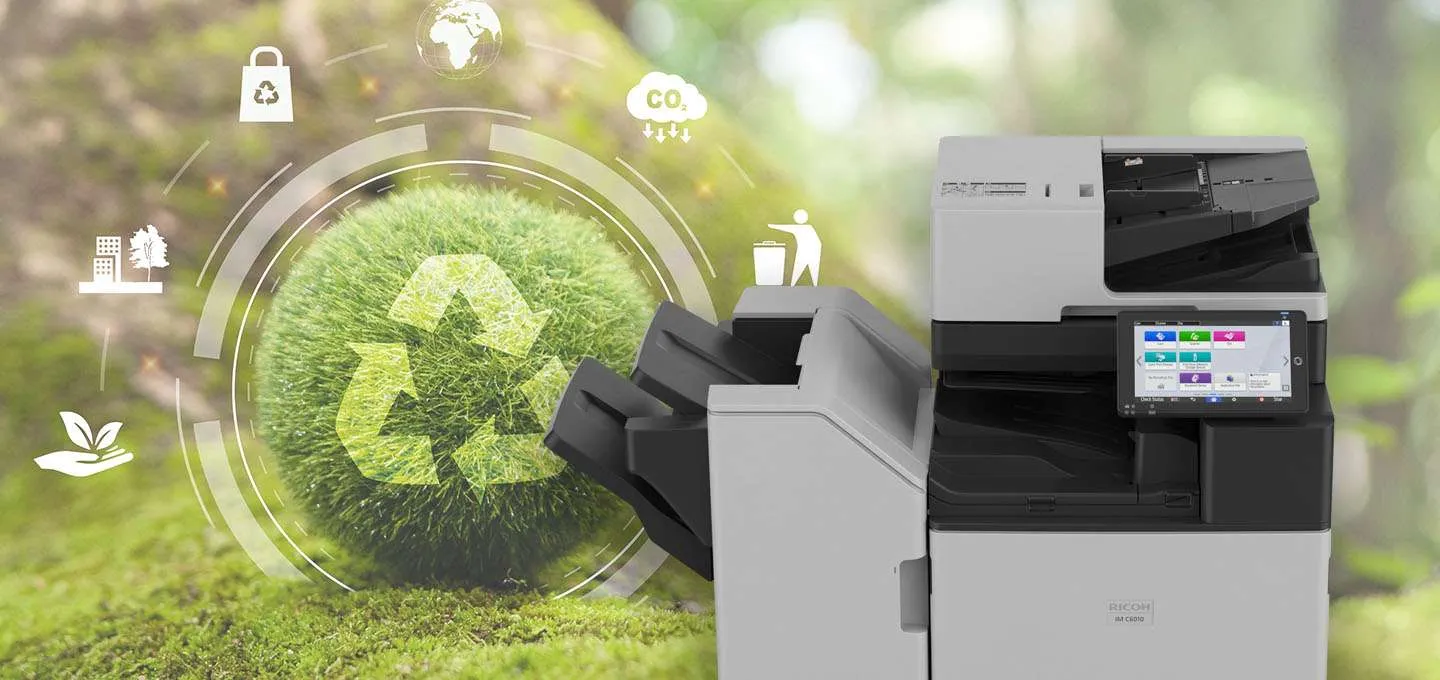Ricoh Supplies and Sustainability: Are Your Office Consumables Eco-Friendly

In 2025, sustainability is not only a buzzword, but a priority. There is a renewed focus on sustainability for B2B companies on sourcing and supply chain management, environmentally responsible corporate goals, and even the office printing environment.
For printers and copiers, the spotlight is usually on the hardware. However, the consumables used on a daily basis: toners, cartridges, drums, and kits can greatly impact your company’s environmental footprint. If your company employs Ricoh systems, the sustainability of Ricoh supplies becomes a very important piece of the puzzle.
So, do your consumables align with your green office initiatives? Equally important, do your wholesale ink and toner distributors support or undermine your eco-friendly initiatives?
This guide helps businesses understand how to evaluate the sustainability of Ricoh printing supplies and look for a reliable B2B supplier with eco-friendly credentials.
Why the Urgent Shift Towards B2B Printing Sustainability
Procurement teams are increasingly prioritizing sustainability as a top concern. ESG metrics, regulatory requirements, and even customer expectations have businesses adopting greener operations. Office printing, though often overlooked, adds significant contributions to landfill waste, carbon emissions, and energy consumption.
The environmental implications of Ricoh supplies are observable from a life cycle perspective:
- Raw materials: Non-renewable plastics and chemical-based toners
- Production processes: Energy-intensive manufacturing
- Logistics: Shipping emissions from global supply chains
- End-of-life waste: Landfilled cartridges and packaging
Eco-aligning consumables not only improves ethics but also business strategy. Changes made in this direction have proven lower operating costs, greater compliance, and higher trust among stakeholders.
Five Green Criteria For Evaluating Ricoh Supplies
Think over these sustainability-centered criteria as guiding questions before your purchase of Ricoh supplies:
- Cartridge Recyclability: Can used cartridges be safely collected, disassembled, and recycled? Avoid products lacking recycling pathways.
- Remanufacturing Options: Does the supplier provide remanufactured cartridges that meet quality standards while using fewer resources?
- Certifications & Compliance: Do the consumables meet environmental restrictions like RoHS, CE, or Blue Angel? Certifications prove sustainability claims.
- Eco-Friendly Packaging: Does the pack use recycled materials or biodegradable substances, and is it minimal to reduce waste?
- Lifecycle Support: Does the distributor provide end-of-life take-back programs or carbon offset services?
A sustainable approach to business should consider the entire product journey, not just the toner’s quality.
Read Also: Cybersecurity Best Practices for Small Businesses
Selecting The Best Wholesale Ink and Toner Distributors
Your distributor can either help or thwart your goal towards sustainable printing. B2B buyers need to evaluate prospective wholesale ink and toner distributors to confirm compliance with contemporary environmental policies.
A responsible distributor should:
- Supply bulk Ricoh supplies with low packaging waste and high transport efficiency.
- Hold contracts with certified recycling companies.
- Provide information on the products’ lifecycle, including the materials used, their origin, and how they are disposed.
- Advocate for the adoption of greener alternatives that do not compromise efficiency for performance.
- Offer return programs for ink and toner cartridges that are used and clearly marked as returnable.
Not all wholesale ink and toner distributors practice sustainability. Look for those who actively help your business streamline operations toward sustainability rather than focus on cost savings.
Balancing Eco-friendliness with Performance
For most procurement managers, the most pressing issue is whether greener alternatives match the performance of more traditional counterparts. In the case of Ricoh-compatible products, print quality, page yield, and device compatibility need to be balanced.
The good news is that sustainability and performance are no longer mutually exclusive. Many Ricoh supplies have been produced with post-consumer plastics and eco-safe toner formulas while still achieving or exceeding their original performance benchmarks.
Talk to your supplier about:
- Do these eco-friendly cartridges still perform well?
- Is there any warranty or replacement policy offered?
- How frequently is the quality control done?
The design of modern eco-friendly cartridges and drums has changed for the better. This change in design will encourage more organizations to adopt greener sourcing habits.
Developing a Green Office Printing Procurement Policy
Sustainability for office printing cannot be achieved by purchasing a single product. Rather, it requires diligent planning and analysis, especially for B2B organizations that focus on eco alignment. These businesses are now implementing procurement policies with three essential elements:
- Supplier Consolidation
High performing aligned distributors who practice environmental sustainability should be prioritized. This change enhances order transparency and negotiation terms. - Usage Audits
Analyze toner and cartridge waste along with per department print volume. Leverage the data to improve procurement and reduce surplus stock. - Employee Awareness
Train new hires in IT or admin roles on sustainability. Encourage them to advocate for duplex printing, reduced draft mode, and digital-first workflows. - Performance Tracking
Establish and evaluate green goal KPIs such as waste reduction per item or recycling participation quarterly.
By engaging all parties and integrating procurement into broader ESG initiatives, Ricoh printing systems can transform into a true sustainability asset for your business.
Ricoh Supplies: The Neglected Opportunity for ESG Improvement
It’s high time B2B purchasers stop perceiving toner and ink as simplistic, routine items. Instead, start thinking of them as ESG assets. As more vendors claim to be green, it is now up to procurement teams to differentiate authentic sustainability from mere marketing efforts.
Through vetted wholesale ink and toner distributors, high-quality Ricoh supplies can:
- Reduce the environmental impact of printing
- Streamline compliance with regulatory reporting burdens
- Enhance your brand’s environmental credibility with partners and clients
- Reduce long-term operational costs by minimizing waste and reorders
As part of a comprehensive print management plan, the use of sustainable consumables provides substantial ROI—both financial and ethical.
Conclusion: Every Print Counts—Make Yours Sustainable
Sustainable printing is an imperative for forward-thinking businesses. Every element from paper selection to Ricoh supplies and the logistics of distribution offers the ability to further reduce one’s environmental footprint.
It is important to work with responsible wholesale ink and toner distributors who understand your goals and provide scalable, eco-smart solutions in 2025 and beyond. Rethinking your consumables strategy for one office or even a global print fleet might be the most transformative step towards making your office more eco-friendly.
Mind your toner choices— choose wisely and print responsibly.





